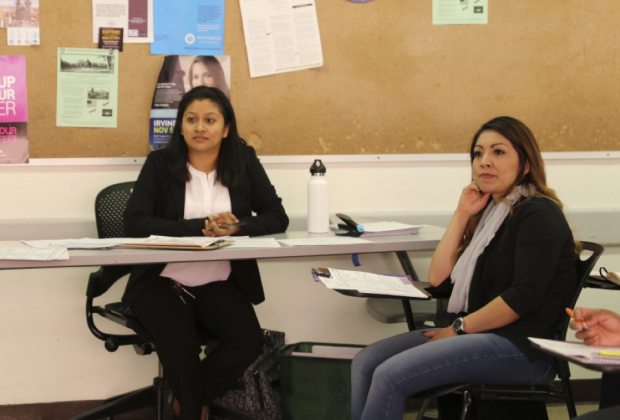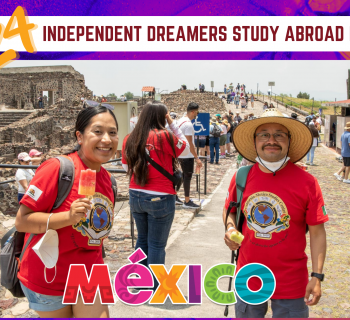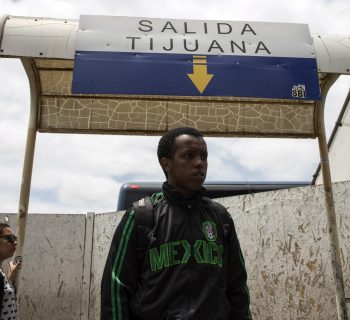By Katherine Mangan, The Chronicle of Higher Education ~ DECEMBER 5, 2016
It’s been 20 years since Sheila Salinas saw her maternal grandparents, or the tiny concrete home on a dusty unpaved road where she grew up in Chalco, Mexico.
As an undocumented student finishing her studies at California State University at Long Beach, she is excited but apprehensive about her planned educational trip to her home country.
That’s because study-abroad options may soon be cut off for her and thousands of other students who have benefited from a policy that gives undocumented students temporary protection from deportation.
President-elect Donald J. Trump has threatened to end the Deferred Action for Childhood Arrivals policy that has allowed more than 740,000 immigrants to study and work in this country on two-year renewable terms.
DACA students, as they’re known, can also study abroad and return lawfully if they receive "advance parole" from the United States Citizenship and Immigration Services. But if DACA is ended, the status that allows them back into the United States might expire as well, immigration experts fear.
As a result, universities and advocacy groups nationwide are warning these students to return to the United States by January 19, the day before Mr. Trump takes office.
They’re also advising them not to study abroad next semester as long as the status of DACA remains in limbo.
The incoming administration’s threat to eliminate DACA comes as a blow to Ms. Salinas, 26, and the administrator who arranged the trip she’s taking later this month.
"I’m nervous, but there’s no way I was going to cancel it," she said. "This may be the last chance I get to see my grandparents."
Armando Vazquez-Ramos, has taken almost 100 students to Mexico over the last three years as part of the California-Mexico Dreamers Study Abroad Program.
The adjunct lecturer in Chicano and Latino Studies at California State University at Long Beach arranges the trips through the California-Mexico Study Center, a nonprofit extension of his department.
As part of the three-week visit, participants like Ms. Salinas can travel independently to visit their birthplaces and reconnect with relatives they may not have seen since they were young children.
Twenty-eight students from 19 colleges are signed up to accompany him on the next study trip, which leaves December 22 and returns January 15 — "timed perfectly, just before this bozo takes over," Mr. Vazquez-Ramos said.
While he said he is heartened by the outpouring of support for undocumented students from college presidents and calls for Mr. Trump to leave DACA alone, "I fear they’re going to say ‘to hell with it.’ They have to feed their base," he said.
DACA, which President Obama put in place by executive action in 2012, gives a two-year, renewable reprieve from deportation to certain young people who were brought to this country illegally when they were children. During that time, they can work and attend college.
"At this point, we don’t know whether the administration plans to rescind the program or not," said Ignacia Rodriguez, a policy advocate with the National Immigration Law Center. She said that students should consult with an immigration lawyer before planning study-abroad trips, but that in general, "We would advise them to be back before January 20. It’s too risky to be out of the U.S. after that."
Leo Van Cleve, assistant vice chancellor for international and off-campus programs at California State University, echoed that advice last month in an email to administrators at each of the system’s 23 campuses.
Unless they are back by January 19, "there is no assurance they will be allowed to return to the U.S. and there is a realistic possibility they will be denied re-entry," he wrote.
Students who are considering studying abroad after that date should consult an immigration lawyer but be aware that there’s a good chance they won’t be able to return to the United States if they’re outside the country after January 20, he wrote.
The university system doesn’t track students by immigration status, so it’s hard to know how many DACA students are studying abroad. But he said he’s aware of only about 10 self-identified undocumented students within the CSU system who are currently studying outside the country. Many more participate throughout the year in short-term, faculty-led study trips.
A Call for Immigration Reform
Across the country, undocumented students are receiving similar advice to come home or delay foreign travel.
Michael A. Olivas, a professor at the University of Houston who teaches immigration law and higher-education law, wrote in an email that he would not recommend that any DACA students travel outside the United States if they plan to return after January 20, "at least until the revisions, if any, become clear." He is on leave from his law-school job while he serves as interim president of the University of Houston—Downtown.
"This is another reason we need Congress to enact immigration reform," he wrote. "They have kept their part of the bargain, and we should not punish them. We need them, and should act to protect them."
Among the DACA recipients having to call off plans to study abroad are Mayte Lara, 18, a freshman at the University of Texas at Austin.
She had been excited about a monthlong trip to Beijing, where she hoped to study social entrepreneurship.
She applied for the program just days before the U.S. presidential election, then said her heart sank when she realized Mr. Trump’s election would make it dangerous to leave the country.
Ms. Lara, who was brought to Texas from Guanajuato, Mexico, when she was 3 and graduated as valedictorian of her Austin high-school class, received a text message from the program organizer suggesting that DACA recipients hold off on traveling abroad.
Her DACA permit expires in September 2017.
In Long Beach, Ms. Salinas said this may be her last chance for a long time to leave the United States.
"I’m really looking forward to spending the holidays with my grandparents and getting to know everything I’ve missed in 20 years," she said. She remembers a volcano that loomed in the distance beyond a green field she passed on her walk to the bus, the coldness of the concrete walls of her house, and the hours spent playing with a cousin with whom she’ll be reunited in a few weeks. "I hope when I arrive," she said, "it will trigger more memories."
Katherine Mangan writes about community colleges, completion efforts, and job training, as well as other topics in daily news. Follow her on Twitter @KatherineMangan, or email her at katherine.mangan@chronicle.com.







